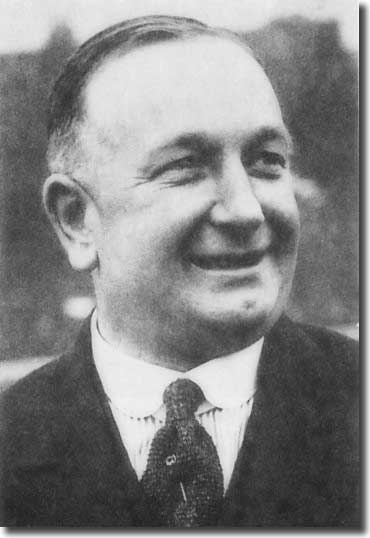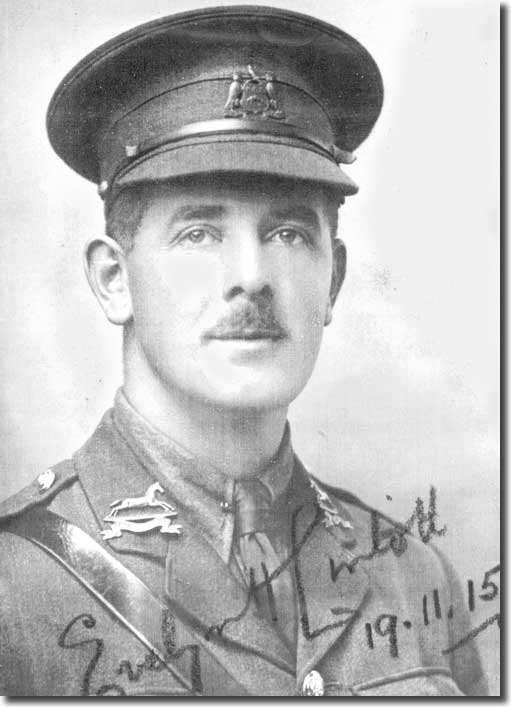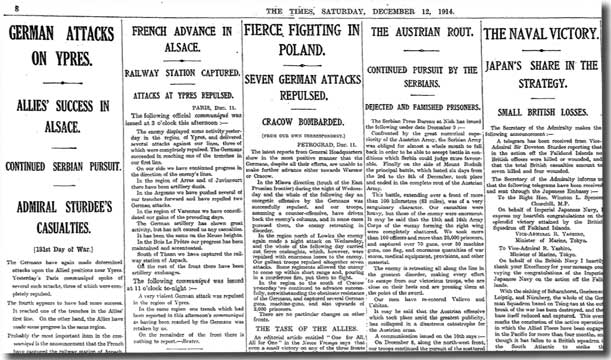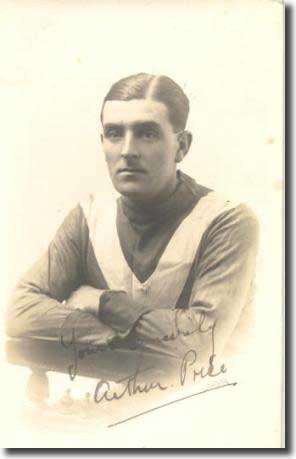 |
 |
 |
 |
 |
 |
 |
 |
 |
Second Division - Elland Road - 5,000
Scorers: Bainbridge 2, McLeod 2, Price 3
Leeds City: Hogg, Blackman, Affleck, Law, Hampson, Foley, Bainbridge, Jackson, McLeod, Price, Sharpe
Leicester Fosse: Barnett, Troughear, Currie, Burton, Harrold, Thompson, Douglas, Mills, King, Whitfield, Anderson
However, the visit of Leicester Fosse to Elland Road on 12 December
brought clear prospects of success. The East Midlanders were in
an even deeper trough than their hosts: two places below them
in the table, they had already suffered ten defeats and were without
a victory since the first week of November. On the 14th of that
month they plumbed new depths by conceding seven goals at Wolves. The week before they faced Fosse, Leeds had shown enough backbone, away
to Nottingham Forest, to hint that they retained the underpinning zest
and ability of the previous campaign. Despite going down by three goals
to one, they had been the better side for lengthy periods of the match.
Yorkist reported for the Leeds Mercury, 'If they had exhibited
a little more dash and fire in the second half they would have won comfortably.' The only change in the City eleven that turned out against Leicester
was an enforced one, with Arthur Price recalled at inside-left
for Jimmy Speirs, ruled out of contention shortly before kick
off by an injury. 24-year-old Geordie Tony Hogg was established as first choice
goalkeeper after Irish international Billy
Scott returned to Merseyside to join Liverpool at the end
of the previous season; Jack
McQuillan, newly signed from Hull City, had started the campaign
as first choice left-back, but injury cost him his place and the
burly Scot, George Affleck, was recalled to partner Fred
Blackman in defence. George Law, Jack Hampson and Mick Foley
were an almost omnipresent half-back line, while Herbert Chapman
had settled for Simpson Bainbridge, John Jackson, Billy McLeod,
Speirs and Ivan Sharpe as his combination of choice up front. Price, whom Chapman had signed from Worksop Town in December 1912, scored
on his City debut, at home to Fulham that month, and managed three goals
in twelve games that first season. He was a regular throughout the 1913/14
campaign and retained his place for the first four games of the current
season; the team's form had been shabby, however, and when Billy McLeod
recovered from illness and Ernie Goodwin broke into the side on the left
wing, Price was consigned to City's Midland League side. The game against
Leicester represented a welcome opportunity for the 28-year-old Sheffield-born
inside-forward to stake a claim for a permanent first team berth. He seized
the opportunity with both hands. Fosse also made a number of changes with Teddy King, normally
a right-half, leading the line, and Norman Whitfield coming in
at inside-left as replacement for regular selection George Hastie. The match was staged in wretched conditions at a windswept and
rain-soaked Elland Road on a dismal winter afternoon. The crowd
barely touched 5,000, City's lowest gate thus far in the campaign. Attendances had been poor all season, with many people vehemently opposed
to the continuation of competitive football while War raged in Europe.
There were opposing views, as reported by the Yorkshire Post at
the beginning of September: 'The question of whether football should be
abandoned during the War is being much debated in sporting circles, and
opinion appears to be divided on the matter. While many people think it
would be a disgrace to this country to have thousands of able bodied players
devoting themselves to the game, and hundreds of thousands of men watching
them, when there is an urgent need for volunteers, others declare that,
like other amusements, football will provide a much needed release for
the large numbers who must be left at home and serve to divert their attention.' Passionately championing the view that the country's priority was manning
the trenches rather than the football enclosure, Colonel C F Grantham,
commander of the so called Footballers' Battalion, sprang an unpleasant
surprise on delegates at a special meeting of league clubs in London when
he read aloud a letter which severely indicted the attitude of professional
players: 'You are aware that some little time ago there was much controversy
in the papers with regard to the manner in which the professional football
player had failed in his duty by not coming forward to serve his country
in its time of stress. The laxity of the football 'This is not the case, as only 122 professionals have joined. 'I understand that there are 40 League clubs, and 20 in the Southern
League, with an average of some 30 players fit to join the colours - namely
1,800. These figures speak for themselves. I am also aware, and have proof
that in many cases directors and managers of clubs have not only given
no assistance in getting these men to join, but have done their best by
their actions to prevent it. 'I am taking the opportunity of your meeting on Monday to ask you gentlemen
if you and your clubs have done everything in your power to point out
to the men what their duty is. Your King and Country call upon every man
who is capable of bearing arms to come forward; and upon those who are
unable to use their best endeavours to see that those that can do so. 'It is no use mincing words. If men who are fit and capable of doing
so will not join, they, and also those who try by their words and actions
to prevent them, will have to face the opinion of their fellow men publicly. 'I will no longer be a party to shielding the want of patriotism of these
men by allowing the public to think they have joined the Football Battalion.' Among the players numbered among Grantham's ranks were former
City skipper Evelyn Lintott
and future Leeds United manager, Frank Buckley, then a centre-half
at Bradford City, both England internationals. The Yorkshire Post: 'Respecting the Association League order for
the reduction of players' wages, the Leeds City players have accepted
the reduced scale, but they have declined to sign the new engagement forms
ordered by the Management Committee of the League. Their object in adopting
this attitude is to protect against the compulsory deduction. In their
opinion, the amount deducted should be regarded as a voluntary contribution
towards the wages of players in less fortunate clubs. Their refusal to
sign the new agreement has been reported to the Management Committee of
the League.' Yorkist concluded in the Mercury, 'There is not the least doubt
that the football authorities decided wisely by ordering the season's
programme to be started as arranged. The populace must have something
to distract their minds from the great crisis, and there can be no denying
that football arouses more interest than any other sport during the winter
months. 'There is an impression abroad that football will not go on for many
weeks; that pressure will be brought to bear on the Football Association
and the Football League authorities to discontinue the game until the
present crisis is less acute. If it could be proved that the continuance
of football will affect recruiting to any great extent, there is not a
single person but would agree to the game being temporarily stopped. My
own view is that the discontinuance of football will not help recruiting
much, but will only add more to the general depression caused by the War. 'His Majesty has expressed the view that racing should be continued as
far as possible, and there is very little doubt that the King will also
be in favour of the continuance of football. Why should racing go on and
football be stopped? 'We may assume that those people who are clamouring for the stopping
of all kinds of sport would also have our theatres, music halls and other
places of entertainment closed. They seem to forget that there are hundreds
of thousands of In the week that Leeds hosted Leicester Fosse, the debate raged on. Representatives
of the four home Football Associations met to discuss a suggestion by
Scotland that international matches should be abandoned for the season.
The Scots also wanted Cup competitions to be cancelled, but that was a
step too far for the others, who concluded that 'there is no evidence
in fact that the playing of football has hindered, or is hindering recruiting.
On the contrary, there is good reason to conclude that football has encouraged
and assisted recruiting … Further, the meeting is of the opinion that
to deprive the working people of our country of their Saturday afternoon
recreation would be very unfair and very mischievous.' There was a major schism between the Scots and the other three
associations and it took some time for the scars to heal. A conflict that many in the summer had boldly predicted would
be over within a matter of weeks was proving stubbornly resistant
to all attempts to bring it to a swift conclusion. On the day
Leeds played Leicester, the national newspapers reported on determined
attacks by the Germans on the Allied positions near Ypres in Belgium,
advances by the French in Alsace, fierce fighting in Poland and
the sinking of the German cruiser Friedrich Karl in the Baltic. The opposing viewpoints were every bit as heated in Leeds as in the rest
of the country and there was little surprise on a grey December day that
the West Riding public should be less than enthused by the attraction
of a grim re-election battle with Leicester. City won the toss and chose to play with a strong wind in the
first half. It was clear from the way they began the game that
the Peacocks were determined to secure a conclusive victory and
they set about the visitors with great vigour. They were rewarded
for their aggression with the opening goal, registered ten minutes
into the engagement. Ivan Sharpe, the England amateur, now restored to his favourite
role on the left wing after a number of outings on the opposite
flank, got the better of Fosse right-back Billy Troughear and
reached the byline before firing in a testing cross. The incisive
ball left the Fosse ranks in a state of confusion and sparked
an untidy scrimmage in the Leicester area. Young City outside-right
Simpson Bainbridge had intelligently backed up the movement and
he was quickest to react to the opportunity, driving a shot past
goalkeeper Barnett to give his team the lead. City did not retain their advantage for long and inside-right
Billy Mills brought Leicester back onto terms with a long range
effort after a miskick by Peacocks full-back George Affleck. It
was a somewhat lucky score which Tony Hogg may well have saved
had he not slipped as he strove to get to the shot. The goal did little to blunt Leeds' confidence and momentum,
and they were quick to press Fosse onto the back foot, swiftly
restoring their lead. Bainbridge was again the beneficiary, with
McLeod the provider this time, and the right winger coolly converted
the centre-forward's cross to notch his second goal. Bainbridge returned the compliment shortly before half time,
sending over a centre which McLeod finished with some assurance,
sending Leeds in at the break with a 3-1 lead and in control of
the contest. The goals had bolstered the home men's brittle confidence and
they continued in the same vein after the break, outclassing their
opponents and forcing them onto almost constant defence. The Fosse
were not comfortable in their work and rarely looked capable of
denying City when they seriously threatened. Leicester were hampered badly in the second half: Whitfield had
to retire with half an hour to go by virtue of a badly bruised
shin while right-back Troughear went off late in the game. Long
before these mishaps Leeds' stranglehold on the game was established,
though while numbers were equal Leicester fought hard to remain
in touch. It was only a matter of time before City increased their advantage
and Arthur Price took it upon himself to finish off the visitors
almost single handed in the second half. He helped himself to
a breathtaking hat trick, his first for the club after managing
braces on a couple of occasions in his two years at Elland Road. For a period in that second half it seemed that everything the
inside-forward touched turned to gold and he was here, there and
everywhere as his colleagues saw to it that he had a steady stream
of possession. Fosse could find no solutions to the problems created
by his intelligent probing. The first of Price's trio came from an unselfish pass by McLeod;
the centre-forward repeated the service for Price's second and
his hat trick came after a telling cross by Bainbridge. It was
an astonishing return to form in a somewhat lacklustre season
for With the Peacocks now five goals to the good, it was understandable
that some of their urgency was diminished. Leicester managed to
pull a goal back following some good interplay between Mills and
right winger George Douglas. The latter took the honours with
a long dipping effort launched goalwards from the touchline. Hogg
got nowhere near saving the shot, which came as something of a
shock after all the one way traffic. There was sufficient time remaining for City to add a seventh
score, providing the sheen their superiority merited. McLeod got
the reward for a hard working display, grabbing his second goal
after a pacy run and accurate centre by Sharpe. High scores were a feature of games between the clubs: in January
1906 Fosse had triumphed 4-1 at Elland Road and in December 1908
had won 6-2 on their own enclosure. February 1913 saw Leeds pull
of a 5-1 victory on home soil, with Price helping himself to two
of the goals. The scores were reversed at Filbert Street a year
later and on 17 April 1915 the East Midlanders repeated that 5-1
victory when the Peacocks travelled to Leicester. The local Press were unstinting in their praise for the way that
the Citizens had recovered their glittering form of the previous
campaign. The Yorkshire Post: 'There had been for several weeks much feebleness
in the scoring attempts of the Leeds City forwards. But the necessity
either for a special effort at improvement, or for a drastic revision
in the constitution of the team, had become obvious. It is satisfactory,
therefore, to find that the players have restored confidence in their
abilities - and perhaps have renewed their own confidence in themselves
- by the way in which they forced goals against Leicester Fosse. 'A week ago attention had to be drawn to the absence of success in organised
attacks by the City forwards. It is therefore satisfactory to be able
to note that the seven goals in Saturday's match were all the direct result
of what may be called frontal attacks. The energy and good judgement of
McLeod meant much to the forward line, and the Leeds centre can be congratulated
on having reproduced the form which caused him to be placed in the running
for international honours last season. 'Excepting that Jackson persistently hung on to the ball too long, all
the Leeds forwards played well, and there was a good level of merit to
the other branches of the team.' JRB in the Leeds Mercury: 'Considering the heavy state of the
ground, the game was as good as one could expect, but the home players
adapted themselves to the conditions far better than their opponents.
Their lusty kicking often carried them into the vicinity of the Leicester
goal, where the forwards missed very few chances. The shooting of the
home vanguard was admirable and Barnett had more than one difficult shot
to negotiate. 'All the City goals were the outcome of cool and clever forward play,
and it has been many a day since the City players scored so prolifically,
or shot so often as they did on Saturday. The passing of the forwards
was also good, while the wing men, Bainbridge and Sharpe, made some very
speedy runs. The inside-forwards also played a capital game with the exception
of Jackson, who was not so quick on the ball as McLeod and Price, the
latter being a fine opportunist. 'The half-backs supported the forwards well, in addition to playing a
good game on the defence. The Leicester forwards were a mediocre lot,
the best of the five being Mills, although King was a hard worker. The
halves, too, played a very moderate game, while the backs were seldom
reliable. Barnett had a busy afternoon in goal, and he had very little
chance with the shots that beat him.' After such a dismal opening half to their season, the easy victory
provided a tremendous fillip for City; Arthur Price's second half
opportunism and the all round combination work of the forward
line revived hopes of better things to come in the West Riding.
It was all the more galling, then, that the Peacocks failed to
build on the display, losing 2-1 at Barnsley the following Saturday.
A season of rumbling inconsistency teetered on as Herbert Chapman
sought in vain to drag his men away from the wrong end of the
table while the guns thundered on in central Europe. After manager Herbert Chapman
led Leeds City to a fourth place
finish in the spring of 1914, there were genuine hopes it would be
a prelude to even better things, but the 1914/15 season ushered in no
golden dawn: each of the opening four league games ended in defeat and
the sixteen fixtures played by the middle of December had yielded just
four victories. That depressing record left the Citizens firmly rooted
in the bottom four of the Second Division and in danger of having to apply
for re-election for the second time in three years. It was a sad fall
from grace.
After manager Herbert Chapman
led Leeds City to a fourth place
finish in the spring of 1914, there were genuine hopes it would be
a prelude to even better things, but the 1914/15 season ushered in no
golden dawn: each of the opening four league games ended in defeat and
the sixteen fixtures played by the middle of December had yielded just
four victories. That depressing record left the Citizens firmly rooted
in the bottom four of the Second Division and in danger of having to apply
for re-election for the second time in three years. It was a sad fall
from grace. professionals
and their following amounted to almost a public scandal. Mr Joynson Hicks
MP, therefore raised the Football Battalion and public opinion died down
under the belief that most, if not all, of the available professionals
had joined the battalion.
professionals
and their following amounted to almost a public scandal. Mr Joynson Hicks
MP, therefore raised the Football Battalion and public opinion died down
under the belief that most, if not all, of the available professionals
had joined the battalion. people
who must stay at home to carry on the ordinary business of the country.
Surely everything in reason should be done to relieve the depression the
War is creating everywhere.'
people
who must stay at home to carry on the ordinary business of the country.
Surely everything in reason should be done to relieve the depression the
War is creating everywhere.' the inside-forward, who was leading the Fosse rearguard a merry
dance with his incisive runs and clever footwork.
the inside-forward, who was leading the Fosse rearguard a merry
dance with his incisive runs and clever footwork.